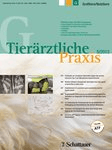
TIERAERZTLICHE PRAXIS AUSGABE GROSSTIERE NUTZTIERE
Scope & Guideline
Connecting researchers and practitioners in large animal veterinary science.
Introduction
Aims and Scopes
- Animal Health and Disease Management:
The journal emphasizes research on the diagnosis, treatment, and prevention of diseases affecting large animals, including cattle, horses, sheep, and goats. This includes studies on infectious diseases, metabolic disorders, and surgical interventions. - Veterinary Practices and Techniques:
It covers advancements in veterinary practices, including surgical techniques, anesthesia protocols, and diagnostic methodologies such as imaging and laboratory testing relevant to large animals. - Animal Welfare and Ethics:
The publication frequently addresses issues related to animal welfare, including humane treatment, management practices, and the ethical implications of veterinary interventions in livestock. - Nutrition and Feeding Strategies:
Research on nutrition, feed additives, and dietary management of farm animals is a core area, emphasizing how these factors influence health and productivity. - Reproductive Health and Management:
The journal includes studies on reproductive health, fertility management, and breeding practices aimed at improving livestock productivity and genetic diversity. - Behavioral Studies and Welfare Assessments:
It also investigates animal behavior, stress responses, and welfare assessments to enhance the management and care of large animals in various farming systems.
Trending and Emerging
- Integrative Approaches to Animal Health:
There is an increasing focus on integrative health approaches that combine traditional veterinary medicine with alternative therapies, such as herbal remedies and holistic management practices. - Precision Veterinary Medicine:
Emerging research in precision medicine, including personalized treatment plans based on genetic and metabolic profiling of livestock, is gaining traction within the journal. - Sustainable Animal Husbandry Practices:
Research addressing sustainable practices in animal husbandry, including environmental impacts and resource management, is trending as global awareness of sustainability grows. - Advanced Diagnostic Tools and Technologies:
The use of advanced diagnostic tools, such as telemedicine and digital health monitoring systems, is becoming more prevalent, reflecting a shift towards technology-driven veterinary practices. - Focus on Animal Welfare and Ethics:
There is a notable increase in articles discussing animal welfare standards and ethical considerations in veterinary practice, highlighting the importance of humane treatment in animal agriculture.
Declining or Waning
- Traditional Veterinary Practices:
There seems to be a waning interest in traditional methods of veterinary practice, such as basic surgical techniques and routine procedures, as newer, more advanced methodologies are being explored and adopted. - Antibiotic Usage in Livestock:
Research specifically focused on antibiotic use and resistance in livestock has decreased, likely due to a broader shift towards alternative treatments and the emphasis on reducing antibiotic use in animal husbandry. - Generalized Nutritional Studies:
While nutrition remains an important topic, generalized studies on nutrition without specific applications or innovative approaches are becoming less common, as more targeted research is favored. - Non-specific Disease Research:
Studies that do not focus on particular diseases or conditions but rather provide broad overviews of animal health issues are less frequently published, indicating a shift towards more specialized research. - Surveys and Questionnaires on Veterinary Practices:
The number of papers based on surveys and questionnaires regarding veterinary practices and farmer opinions has diminished, suggesting a move towards more empirical research methods.
Similar Journals
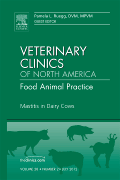
VETERINARY CLINICS OF NORTH AMERICA-FOOD ANIMAL PRACTICE
Elevating Standards in Veterinary Practice for Food AnimalsVETERINARY CLINICS OF NORTH AMERICA-FOOD ANIMAL PRACTICE is a premier peer-reviewed journal dedicated to advancing knowledge in the field of food animal veterinary medicine. Published by W B SAUNDERS CO-ELSEVIER INC, this journal serves as a vital resource for veterinarians, researchers, and students, facilitating the dissemination of high-quality, impactful research and reviews. With an impressive Q1 ranking in both the fields of Food Animals and Medicine, and a notable Scopus rank of 2 out of 39 in Veterinary Food Animals, the journal plays a critical role in addressing the complexities and advancements in food animal health. Although it is not an Open Access journal, subscribers have access to a wealth of articles that are pivotal to the profession. Founded in 1971, the journal continues to provide cutting-edge insights and support for effective practices in veterinary medicine through 2024 and beyond. Its commitment to excellence and relevance ensures it remains an indispensable source for the latest developments in the veterinary field.
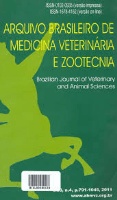
ARQUIVO BRASILEIRO DE MEDICINA VETERINARIA E ZOOTECNIA
Elevating research standards in animal health since 1996.ARQUIVO BRASILEIRO DE MEDICINA VETERINARIA E ZOOTECNIA, an esteemed publication in the field of veterinary medicine and animal science, has been a vital resource for researchers and professionals since its inception in 1996. Published by the ARQUIVO BRASILEIRO MEDICINA VETERINARIA ZOOTECNIA, this journal is recognized for its open-access model, allowing widespread dissemination of knowledge since 1999. With a 2023 Scopus ranking placing it in the 25th percentile within the veterinary field, ARQUIVO BRASILEIRO is categorized in Q3 in Veterinary (miscellaneous), highlighting its commitment to scholarly excellence. The journal's scope encompasses a diverse range of topics related to veterinary medicine and zootechnics, making it a crucial platform for advancing research and professional practice. Situated in Belo Horizonte, Minas Gerais, Brazil, it serves not only the local community but also an international audience, fostering collaboration and innovation in veterinary sciences. As such, ARQUIVO BRASILEIRO is an invaluable asset for students, researchers, and practitioners looking to stay at the forefront of veterinary research.

Tropical Animal Science Journal
Exploring Innovations in Veterinary Medicine and Animal ScienceTropical Animal Science Journal, ISSN 2615-787X, E-ISSN 2615-790X, is an esteemed open-access journal published by the Bogor Agricultural University, Faculty of Animal Science. Launched in 2018, this journal serves as a pivotal platform for disseminating high-quality research in the fields of Animal Science, Food Animals, and Veterinary Medicine. With its significant presence in Indonesia and a commitment to scientific innovation, it has achieved a Q3 ranking in Animal Science and Zoology and Food Animals, as well as a Q2 ranking in Veterinary (miscellaneous) as of 2023. The journal also enjoys favorable Scopus rankings, placing it in the 61st percentile for General Veterinary and demonstrating its relevance and impact in the academic community. As an advocate for open-access publishing since its inception, the journal enhances accessibility to critical research findings, making it an invaluable resource for researchers, professionals, and students alike who aim to advance their knowledge and contribute to the fields of tropical animal science.

Brazilian Journal of Hygiene and Animal Sanity
Exploring the vital link between animal welfare and public health.Brazilian Journal of Hygiene and Animal Sanity is an esteemed academic publication dedicated to advancing the fields of veterinary science, animal health, and public health in Brazil and beyond. Published by UNIV FEDERAL CEARA, CENTRO CIENCIAS AGRARIAS, this journal serves as a vital resource for researchers, professionals, and students, providing peer-reviewed articles that explore critical issues related to hygiene practices, disease prevention, and animal welfare. With an ISSN of 1981-2965, the journal prioritizes the dissemination of innovative research findings and methodologies, aiming to impact the quality of life for both animals and humans significantly. Although currently not an Open Access journal, it continues to seek partnerships that will enhance its reach and accessibility. Situated in Fortaleza, Brazil, the journal is poised to become a cornerstone for those engaged in the study and improvement of zoonotic diseases and sanitation practices, reflecting the essential intersection of animal health and public wellbeing.

Revista de Investigaciones Veterinarias del Peru
Empowering Veterinary Professionals Through ResearchRevista de Investigaciones Veterinarias del Peru, published by UNIV NACIONAL MAYOR SAN MARCOS, stands as a pivotal resource within the field of veterinary sciences. With its ISSN 1682-3419 and E-ISSN 1609-9117, this journal aims to publish innovative research contributing to the advancement of veterinary practices and animal health. Since its inception in 1999, it has fostered an academic platform for professionals and researchers alike to share findings that are crucial for understanding and improving animal welfare in Peru and beyond. Although currently positioned in the Q3 category of Veterinary (miscellaneous) and ranked #163 out of 194 in the Scopus database, the journal's commitment to quality research and open access to veterinary knowledge continues to attract submissions and readership from a diverse audience. As it moves forward into 2024, the Revista de Investigaciones Veterinarias del Peru remains dedicated to disseminating critical insights that promote evidence-based practices in the veterinary field, stimulating further research and collaboration across continents.
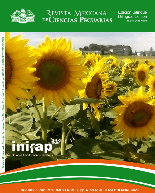
Revista Mexicana de Ciencias Pecuarias
Advancing Animal Health and Welfare Through ResearchRevista Mexicana de Ciencias Pecuarias, published by INIFAP-CENID PARASITOLOGIA VETERINARIA, is a prominent open-access journal since 2010 that caters to the fields of Animal Science and Veterinary Medicine. Based in Mexico, this journal addresses critical issues in animal health, production, and welfare, making it instrumental for researchers, professionals, and students seeking to advance their knowledge and practices. With an impact factor that reflects its growing influence, particularly in the Q3 quartile rankings in both Animal Science and Zoology as well as Veterinary (Miscellaneous) categories, the journal provides a vital platform for the dissemination of innovative research and findings. Additionally, its Scopus Ranks position highlights its role in publishing significant contributions to the fields of Veterinary Science and Agricultural Biology. The journal fosters a collaborative learning environment through its open-access model, ensuring that valuable insights are accessible to a wide audience. For those committed to enhancing animal well-being and advancing veterinary practices, the Revista Mexicana de Ciencias Pecuarias stands as a key resource through its rigorous peer-reviewed publication process and commitment to scientific excellence.

REVISTA CIENTIFICA-FACULTAD DE CIENCIAS VETERINARIAS
Fostering innovation in veterinary and agricultural research.REVISTA CIENTIFICA-FACULTAD DE CIENCIAS VETERINARIAS, published by the Universidad del Zulia, is a prominent open-access journal dedicated to advancing the fields of veterinary science, animal science, and food science. Since its inception in 1997, the journal has served as a vital platform for disseminating quality research and fostering academic dialogue among professionals and scholars in the veterinary and agricultural sectors. With its commitment to open access since 2010, the journal aims to make valuable research freely accessible to a global audience, thereby contributing to the advancement of scientific knowledge. Although currently categorized in the bottom quartile of various fields—including Animal Science and Zoology, Food Science, and Immunology—REVISTA CIENTIFICA-FACULTAD DE CIENCIAS VETERINARIAS is dedicated to nurturing innovative research that addresses pressing challenges in veterinary and related sciences. Researchers, professionals, and students will find this journal to be an important resource for quality studies that have implications for animal health, food safety, and biotechnology in the context of Venezuelan and international landscapes.

BMC Veterinary Research
Leading the way in impactful veterinary discoveries.BMC Veterinary Research, published by BMC in the United Kingdom, stands as a pivotal open-access platform dedicated to advancing the field of veterinary science since its inception in 2005. With an impressive impact factor that reflects its influential presence, this journal has achieved a remarkable ranking of #17 out of 194 in the Scopus Veterinary category, placing it in the 91st percentile among its peers. The journal serves as an essential resource for researchers, professionals, and students alike, fostering the dissemination of high-quality research and innovative practices within the veterinary and broader medical communities. With its commitment to open access, BMC Veterinary Research ensures that valuable insights are accessible to all, promoting collaboration and knowledge sharing that drive the advancement of veterinary sciences. As it continues to publish significant findings until 2024, it remains a key contributor to the contemporary discourse on animal health and welfare.

CANADIAN VETERINARY JOURNAL-REVUE VETERINAIRE CANADIENNE
Exploring the frontiers of veterinary medicine in Canada.Canadian Veterinary Journal - Revue Vétérinaire Canadienne is a prominent peer-reviewed journal published by the Canadian Veterinary Medical Association. Established in 1965, this journal aims to advance knowledge within the field of veterinary medicine and contributes significantly to the development of veterinary practices through the dissemination of high-quality research. With a robust focus on both general and specialized veterinary studies, the journal holds a Q2 ranking in the Veterinary (miscellaneous) category and a Q3 categorization in Medicine (miscellaneous) as of 2023, reflecting its vital role in academic discourse. Researchers and professionals can expect a diverse range of topics that explore the intricacies of animal health and welfare, making it a vital resource for advancing veterinary science in Canada and beyond. Although the journal does not operate under an open access model, it remains a respected platform for disseminating impactful research. With a long-standing tradition of excellence, the Canadian Veterinary Journal is an invaluable tool for veterinarians, researchers, and students committed to enhancing animal health and veterinary practices.
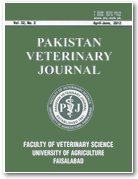
PAKISTAN VETERINARY JOURNAL
Fostering collaboration for a sustainable veterinary community.Pakistan Veterinary Journal (ISSN: 0253-8318, E-ISSN: 2074-7764) is a leading peer-reviewed academic journal published by the University of Agriculture, Faculty of Veterinary Science, situated in Faisalabad, Pakistan. Since its inception, the journal has embraced an Open Access policy, facilitating the dissemination of vital research findings to a global audience and enhancing the visibility of veterinary science. With an impressive Q1 ranking in the veterinary miscellaneous category, the journal ranks #27 out of 194 in the veterinary general field according to Scopus, placing it in the top 14% of the discipline. The scope of the journal encompasses a wide array of topics relevant to veterinary medicine, ensuring that it serves as an essential resource for researchers, professionals, and students alike. By providing a platform for high-quality research from 2009 to 2024, the Pakistan Veterinary Journal continues to play a pivotal role in advancing veterinary science, promoting collaboration among scholars, and addressing contemporary challenges in animal health and welfare.